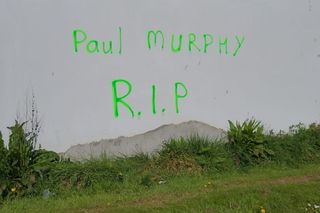Backlash on the doorsteps: An Post stopped TV licence inspections and gave staff ‘resilience’ training after RTÉ scandal
Full inspections have resumed, as overall fines fall 40pc in past 12 months
An Post was forced to stop TV licence inspections and offer 'resilience' training to staff due to a public backlash over the RTÉ payments
An Post was forced to stop TV licence inspections and offer “resilience” training to staff because of public anger over the RTÉ payments scandal.
A spokesperson said increased hostility, mainly in the form of verbal abuse, led An Post to take action to protect its workers.
A union representing TV licence inspectors claimed their lives had become “almost impossible” since a political party allegedly “signalled permission” for non-payment of the fee.
The An Post spokesperson said the level of aggression and abuse experienced on doorsteps was sufficient to cause concerns among staff.
Resilience training was introduced and an external expert guided inspectors through potential real-life situations and how to deal with challenging scenarios.
Full inspections, including house-to-house calls, have since resumed.
It comes as the latest figures reveal the total of fines issued to people for having no TV licence has fallen by 40pc in the last 12 months.
Fines totalling €18,397 were imposed in January 2022. That figure increased to €38,394 in January last year. However, the overall fines imposed in January of this year fell to €22,927 – a decline of 40pc.
Some analysts queried whether this reflected concern within the judiciary over the numbers now refusing to pay for a TV licence in response to the RTÉ scandal. However, latest statistics – released by the Courts Service – indicate a crackdown is under way on those who have refused to pay the €160 fee.
Convictions for non-payment of a television licence soared between January 2022 and January this year. In December 2022, 255 convictions were recorded. That figure rose to 296 last December and then to 454 the next month.
An average of 60 people a day are now facing prosecution for not paying their TV licence. There are significant delays between people not renewing their TV licence and the matter appearing before the courts.
Licence-fee revenue dropped by more than €5m in the first three months of this year compared to the same period last year, according to new data.
Figures supplied by the Department of Media show there were 195,479 licence sales between January and last month. This compares with 229,490 in the same three months last year.
Sales have dropped since January when 75,183 were issued, followed by 61,101 licences in February, and 59,195 last month.
Last year, there were 78,389 licences sold in January, 71,891 in February and 79,210 in March. Total TV licence sales recorded by An Post last year amounted to 824,278 compared to 947,924 the previous year.
Concerns are now mounting that courts will face a deluge of TV licence cases over the coming months.
Meanwhile, a report by the Communications Workers’ Union (CWU), to be presented at its biennial delegate conference this week, says the future of the TV licence “remains in abeyance” as the debate continues in government circles.
“This hasn’t been helped by the recent scandal surrounding RTÉ,” it said.
“This has made the job of the TV licence inspectors, who already do a difficult job, more challenging.”
The union said it took issue with a prominent politician’s comments that made inspectors “targets”.
It said the inspectors attracted unfair criticism and An Post had been obliged to issue guidance to staff on how to protect themselves while carrying out their work.
“At the time of writing, there is a lot of speculation on the future of the TV licence, with a number of politicians stating a preference for exchequer funding. One party has introduced legislation to the Dáil for the TV licence to be scrapped and that an amnesty be provided for those who refuse to pay it,” it said.
The CWU added that this has made the job of the TV licence inspector “almost impossible”, because it “has signalled permission for non-payment from a major political party”.
The union said it had written to the TD who proposed the legislation, outlining its concerns.
It was continuing to remind the Government that a high number of employees were involved in the collection of the TV licence and there was a requirement to take them into account when deciding on the future of the contract.
Sinn Féin TD Thomas Gould said he had been contacted by the union and that he understood its officials’ frustration in relation to its members.
He denied the party was advocating non-payment of the licence fee. He said the union’s representatives had said harassment of inspectors had been going on for years.
“I’ve been on the record to state that people should not break the law and comply with the licence fee,” he said.
“But what we are saying is we would scrap the licence fee and replace it with direct exchequer funding.”
Join the Irish Independent WhatsApp channel
Stay up to date with all the latest news














